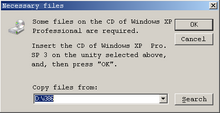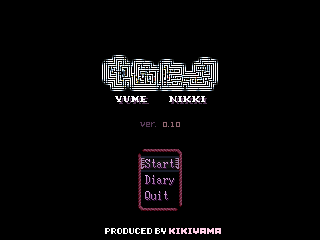Overview
Technical difficulties may occur while playing Yume Nikki and its fan games. Below are some common issues and instructions on how to fix them.
Unzipping Programs
Windows
7-Zip
- Simply Download the type for your computer
There are many unzipping programs you can use to unzip fangames, but it is highly suggested to download 7-Zip, because any other programs will mess up Japanese file names, and some you need to pay, or has only a demo version when 7-Zip is virus free and free to use! You will need to set correct locale in system settings or via locale emulator in order to extract non-Unicode archives most of zip ones.
HaoZip
For unzipping Chinese fangames it is best to use HaoZip, as it will keep the Chinese characters from messing up during extraction. It is completely free to use and virus free.
Bandizip
A free unzipping program that can change the code page easily without system locale changes or locale emulators and supports many formats. If your game's locale is Japanese, click Code Page on the upper right and choose Japanese to change the code, check the preview then extract the file
Japanese Support
Most Yume Nikki fangames are Japanese, and coded in Japanese Locale. For systems other than Windows, you may need to use Wine, EasyRPG or some other program to get a game working on Mac or Linux.
Windows XP or below
You must ABSOLUTELY have Japanese Locale the last option on Applocale on EVERYTHING. When extracting, use Applocale. When booting the game, use it. If you feel more comfortable, you can set your system's locale to Japanese instead of using Applocale.
Installing East Asian Languages on Windows XP
NOTE: You must have your Windows XP installation CD or at least the necessary files. These can also be downloaded from Microsoft, but pirated OS's must stay far away from it.
- Enter the Control Panel, then go to Date, Time, Language and Regional Options, and finally to Regional and Language Options. Sometimes you will be able to go directly to the Regional and Language options depending on your Control Panel display.
- Click on the Languages tab and check the Install East Asian Languages box under Supplemental language support.
- Insert your OS installation CD and click Ok. If you don't have the installation CD, but have the /i386/ NOT sure about this, since I have the Service Pack 3 folder with all the necessary files somewhere, click Ok and select the path where the folder is.
Downloading and using Microsoft Applocale
Microsoft Applocale is a useful tool that emulates another language's locale, so you can use programs in different languages without changing the whole computer's locale. It can be downloaded here.
After installed, using Applocale is very simple.
- When you open the program, it asks if you want to add or remove programs or launch an application. Select the Launch an application box and then browse for the one you want. IMPORTANT NOTE: Applocale won't locale. rar and. zip files, so you'll have to search for your WinZip or WinRar. exe, and from there export your files. DON'T forget to always extract things with Japanese locale!
- It then asks the language you want. Select the last one, or 日本語. That's Japanese.
- It will then ask if you want a shortcut to the application. I usually make shortcuts for the games' RPG_RT.exe and for WinRar, so I won't have to do all the previous steps every time I want to play.
Just remember to use it EVERYWHERE related to Japanese games.
Microsoft Applocale alternatives
Microsoft Applocale may not work with the latest versions of Windows. In this case you can try the Locale Emulator software, which should work on Windows 10 and 11.
Changing the System Locale
If you would rather change your whole computer's locale to japanese instead of using Applocale, do the following:
- Go to the Control Panel and then Regional and Language Options.
- Click on the Advanced tab.
- Under System current locale, select the language from the drop-down list.
Linux with Wine
First, enable the Japanese locale. $ means use the terminal.
For Ubuntu/Debian/Arch/Gentoo, or other systems with /etc/locale.gen:
- $ sudo nano /etc/locale.gen
- You're looking for ja_JP.UTF-8. Either uncomment the line that it's on, or add it to the file if it's not there. Then save.
- $ sudo locale-gen
For systems without /etc/locale.gen:
- $ sudo localedef -i ja_JP -f UTF-8 ja_JP.UTF-8
...Next, run your program as: (replacing RPG_RT.exe with the name of your executable)
$ LANG=ja_JP.UTF-8 wine RPG_RT.exe
You might also need, depending on the game: (Be sure to check your system package manager first before installing these manually!)
- Japanese fonts, MS Gothic in particular. MS Gothic can be found on a Windows machine as C:\Windows\Fonts\msgothic.ttc, if installed. Dump these in either ~/.fonts or /usr/local/share/fonts.
- Plugins for GStreamer.
- MIDI support. Grab FluidSynth or Timidity and a SoundFont like Fluid.
For other locales, modify the ja_JP.UTF-8 string, substituting ja with a language in lowercase and JP with a country code in uppercase, e.g. zh_CN.UTF-8 for Simplified Chinese. Leave the UTF-8 alone unless you know what you're doing.
RPG Maker Run-Time Package
To play most of the fangames, you will need the RPG Maker Run-Time Package, RTP for short.
- RTPs used for most games:
- Japanese 2000 RTP (MUST USE JAPANESE LOCALE TO INSTALL)
- Japanese 2003 RTP (MUST USE JAPANESE LOCALE TO INSTALL)
- English 2003 RTP (Fan-translated version)
- Japanese VX RTP (MUST USE JAPANESE LOCALE TO INSTALL)
- Japanese VX Ace RTP (MUST USE JAPANESE LOCALE TO INSTALL)
- English 2000 - VX Ace RTP (For official versions of RPG Maker)
- (If the installation stops at 44% with an error, you most likely forgot to extract it with Applocale, or Applocale doesn't work on your system.)
Missing File Errors
Most of the time, an error will come up for a missing file. Sometimes it's a specific file in the game, but most of the time it's a few RTP files that aren't used in-game, but are part of the RPG Maker engine.
Here is an album of common missing files:
Missing Files
WOLF RPG Editor
WOLF RPG Editor games don't need any RTP or extra downloads. After you download the game, remember to extract the file with Japanese encoding, then use Microsoft Applocale or Locale Emulator to open the start button.
Other problems
I'm using Windows Vista and the game doesn't work!
If you have any troubles with making any games work on Vista, you can try these:
- Right-click the application and click on Properties.
- Click on Compability and select Windows XP Service Pack 2.
- Click Ok.
OR
- Right-click the application
- Click on Advanced
- In the Dialog window, check the box Run As Administrator.
If neither of those work, you could always try running to the hills.
My character keeps going up without me pushing any buttons!
This is a common problem in RPG Maker games, from 2000 to VX. The reason as to why this happens is still a mystery, but you could try one or all of the following:
- Try using the arrow keys on the numpad. These can usually regain control of the character.
- Reboot your computer.
- Turn your computer off for some minutes. Let it cool down, take a breath.
- Stay away from RPG Maker games for a while, even after rebooting.
- Reinstall RPG Maker (if you're using it).
- Reinstall the RPG Maker RTP of the game you're trying to play.
- Try to run the game with your computer in safe mode click run, write administrative tool, click on system configuration, boot, boot options, safe boot, and select active directory repair then reboot your computer. If the problem continues, try to disconnect your computer from the internet or try with the minimal boot option. Note: to restore your computer to normal boot, repeat the steps and uncheck safe boot.
- Unplug peripherals such as webcams and joysticks.
Again, if those don't work, running to the hills sounds like a good idea.
It's kind of laggy/Fullscreen and Window Mode
This is so common I don't even. The resolution most people use is actually x2 of the original, which might make the game lose its smoothness. Most people also don't realize they're playing it on x2.
There's some solutions to it:
- Pressing F4 toggles Fullscreen on/off. If you start fullscreen and you don't want it, pressing F4 will help you. If you want to go back to fullscreen, F4 is your friend.
- Alternatively, pressing Alt + Enter also toggles fullscreen mode on/off.
- F5 toggles screen size from x1 to x2. Pressing F4 to leave fullscreen will, in most of the times, leave you with x2, as well as playtesting it from RPG Maker also gets you x2.
BGM Background Music Isn't Playing in RPG Maker 2000-2003
Go to Control Panel and double click the Sound and Audio Devices icon. Then under the Audio tab, under Sound Playback, click the Volume. button. Once the screen pops up, just increase your SW Synth volume tab. You should be able to hear music in RPG Maker 2000-2003 now. (Taken from link)
DirectDraw Error (DDERR_UNSUPPORTED)
This error most commonly occurs with games that open/try to run on fullscreen.
- Right-click on the start up file (ie. RPG_RT.exe) and select Properties from the drop-down menu.
- Click on the Compatibility tab in the Properties box.
- Tick the box that says: Run this program in compatability mode for: whatever OS is given by default.
- Optional: Tick the box that says: Run in 640 x 480 screen resolution
- Click OK or Apply and exit.
You should be now be able to run the game in fullscreen without crashes.
RPG Maker 2003 Runtime Package is not present or not registered
Go into the game folder and scroll down to the RPG_RT.ini file (icon has a gear in the corner). Right-click it and open the file in a text editor program (ie, Notepad). On a new line type: FullPackageFlag=1. Save and exit. The game should now run without giving that specific error. You may also want to check that you have the correct RTP installed for the game.
External Links
Uboachan Thread
(A helpful thread with basic instructions also, and where you can request further information on any error not listed here or on the thead.)


